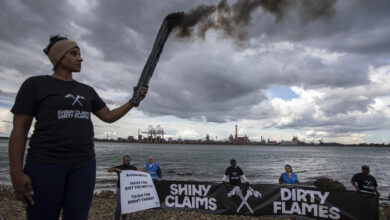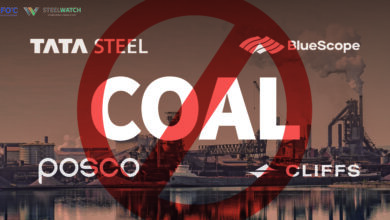Australian government props up fossil steel production with clean energy grant

BlueScope has been handed AUD136.8 million from the Australian government’s Critical Inputs to Clean Energy Industries (CICEI) program to reline a blast furnace at its Port Kembla steel plant, keeping its emissions-intensive, coal-based operation going for decades to come.
As detailed in SteelWatch’s Sunsetting Coal in Steel report (1), relining blast furnaces is fundamentally incompatible with emissions reduction obligations under the Paris Climate Agreement.
“The steel sector is a carbon bomb that will make global efforts to limit global warming to 1.5DegC impossible if we do not start cutting emissions this decade. Retiring blast furnaces instead of relining them, and investing money into future-proofing the sector with hydrogen-direct reduced iron and electric arc furnaces is the way to protect jobs and our future from climate change. Spending Government ‘clean energy’ money on a coal-burning blast furnace would be madness in any country, but is stupendously wrong-headed in Australia, the country that has potential to supply the sector globally with green iron made from green hydrogen. ,” said Caroline Ashley, SteelWatch executive director.
“Every dollar that goes into relining a blast furnace is a dollar not invested in technologies to decarbonise the steel industry. Even with this injection of taxpayer money, Bluescope still needs financiers, including banks and investors. They must know that its decision to continue relying on coal is in stark contradiction with the climate emergency, and they must immediately refuse to support any coal-based projects.” said Cynthia Rocamora, industry campaigner at Reclaim Finance.
“BlueScope relining instead of retiring this furnace is self-defeating from a finance perspective. Blast furnaces are increasingly seen as stranded assets by commercial banks, as demonstrated by ING’s recent announcement (3) that they won’t provide dedicated finance to new unabated blast furnaces, or blast furnace relinings. While the Australian government may be willing to throw a lifeline now, the long term outlook of securing finance for a heavily polluting asset looks grimmer every day as banks double down on their climate commitments,” said Julia Hovenier, Banks and Steel Campaigner at BankTrack.
Ends
For media inquiries, please contact:
Caroline Ashley
Director, SteelWatch (United Kingdom)
+44 7947 691 911
Cynthia Rocamora
Industry Campaigner, Reclaim Finance
+33 7 81 33 61 60
Julia Hovenier
Banks and Steel Campaigner
[email protected]
+31 640 371179
Greg McNevin
Communications, SteelWatch (Australia)
+61 475 247 044
Notes:
- Retiring blast furnace steel production is essential. SteelWatch analysis (https://steelwatch.org/reports/sunset-coal-in-steel/) shows that a business as usual approach to continued blast furnace production would gobble up almost a quarter of the carbon budget that remains for the entire planet (all countries, all sectors) to have a 50 percent chance of staying within 1.5DegC of warming. Business as usual cannot be tolerated.
Steel produced through the blast furnace route drives over two tonnes of CO2 emissions per tonne of liquid steel. So the 1,023 blast furnaces in operation globally will all need to be phased out for a net zero industry. OECD countries need to lead the way. - Blast furnaces also drive toxic air pollution for workers and communities. Closure of a coking plant in Pittsburgh (USA) led to a 42 percent drop (https://iopscience.iop.org/article/10.1088/2752-5309/ace4ea) in cardiovascular-related emergency room visits. The US Burns Harbor steel plant, with its two blast furnaces, emitted substantial lead and cancer-causing benzene in 2016, earning it the title of the ‘largest source of industrial lead pollution’ (https://www.chicagotribune.com/news/ct-met-burns-harbor-steel-mill-lead-pollution-20180723-story.html) in the US.
- ING, a major dutch bank and key financier of the metallurgical coal and steel industry, updated its energy policy in December 2023 (https://reclaimfinance.org/site/en/2024/01/10/decarbonizing-steel-ing-first-bank-to-act/ ) to state that they will no longer provide dedicated finance to new coking (metallurgical) coal mines or the expansion of existing coking coal mines. In line with their stance on coking coal mines, they also decided to no longer provide dedicated finance for new unabated blast furnaces, and for projects that extend the lifetimes of existing unabated blast furnaces. The policy update was welcomed by climate campaigners
For all media queries, please contact [email protected]



